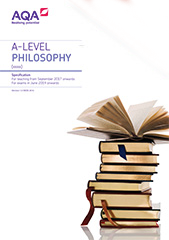Subject content
A-level philosophy comprises four topic areas: Epistemology, Moral philosophy, the Metaphysics of God and the Metaphysics of mind.
Students are required to demonstrate knowledge and understanding of the content, including through the use of philosophical analysis (conceptual analysis and argument analysis). They must also be able to analyse and evaluate the philosophical arguments within the subject content to form reasoned judgements. In doing this, they will:
- understand the ways in which philosophers have analysed the core concepts of philosophy, and be able to identify how subtle differences in analyses can have wider impacts on philosophical arguments
- understand the main philosophical arguments within topics, through the works of philosophers, and articulate those arguments in appropriate forms, correctly, clearly and precisely
- understand the philosophical claims which are made within each topic and be able to articulate those claims correctly, clearly and precisely. Students must also articulate how those claims might relate to other topic areas
- understand the ways in which philosophical arguments are developed, issues are raised, and arguments are reformulated in response to those issues
- understand the similarities and differences between the forms of reasoning used in different philosophical content areas, including the similarities and differences between different kinds of knowledge
- generate responses using appropriate philosophical formats, to a range of philosophical questions. These responses must include: articulating definitions; articulating arguments and counter-arguments; and selecting, applying and evaluating appropriate material to generate their own arguments.
At the end of each topic is a list of texts related to that topic. Students must demonstrate an understanding of, and the ability to make a reasoned evaluation of, the arguments set out in those texts. Where a particular section of text is specified, students are not expected to be familiar with arguments beyond that section. Credit is available, where appropriate, for students whose responses demonstrate wider reading and understanding, but full credit is available for students who don’t go beyond the specified section(s).
Students must also demonstrate understanding of and be able to use philosophical terminology correctly. In addition to the philosophical terminology set out in each section, students must understand and be able to use the following philosophical terminology:
- assertion/claim, proposition
- antecedent/consequent
- analytic/synthetic
- a priori/a posteriori
- necessary/contingent
- consistent/inconsistent
- objective/subjective
- tautology
- dilemma
- paradox
- prove/proof
- true/false
- justification
Students must also understand and be able to use the language of argumentation correctly and be able to:
- identify argument within text
- identify the structure of an argument: premises (including assumptions), reasons, conclusions (including sub-conclusions) and inferences
- identify different forms of argument – including deduction and induction (including abduction) – and be able to analyse and evaluate arguments in ways appropriate to their form (including in terms of validity/invalidity, soundness/unsoundness, certainty/probability)
- recognise and deal appropriately with different types of arguments/reasoning, including arguments from analogy and hypothetical reasoning (including the use of Ockham’s Razor)
- recognise and deal appropriately with flaws in argument, including circularity, contradictions, question-begging and other fallacies
- use examples and counter-examples
- generate arguments, objections and counter-arguments.
The subject content sets out what should be taught and learned. Where particular subject content is marked with an ie (that is), then that content must be taught. Ie (that is) is used to clarify precisely what is meant by specific content.
